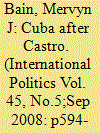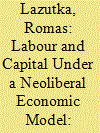| Srl | Item |
| 1 |
ID:
117240


|
|
|
|
|
| Publication |
2013.
|
| Summary/Abstract |
This paper provides an ex-post assessment of the climate and energy policy developments in Chile emerging from a neoliberal economic model, during the period 1971-2007. First, correlation and regression analyses were performed to analyse historical CO2 emissions as a product of demographic, economic and energy-wide drivers. Then I estimate indicators related to CO2 emissions, energy use and economic activity. In the light of empirical results, I identify policy instruments and structural issues. Finally, I present a comparative analysis of Chile and other Latin American countries. Statistical tests show that variability of CO2 emissions is explained mostly by GDP per capita ('affluence') than any other tested variable. Indicators show that the diversification and decarbonisation of the energy mix has been a major policy challenge. With two notable exceptions (hydro and natural gas), the CO2 intensity of the energy supply mix suggests no effective policies, while energy security crises triggered negative carbon effects and increased prices. No clear policies to promote energy efficiency can be identified until 2005. Explicit policy instruments to promote renewable energy are only recognised after 2004. The results strongly suggest that Chile lacked of policies to effectively decarbonise its energy-economy system.
|
|
|
|
|
|
|
|
|
|
|
|
|
|
|
|
| 2 |
ID:
082930


|
|
|
|
|
| Publication |
2008.
|
| Summary/Abstract |
The focus of this article is the relationship that developed between Russia and Cuba in the years since the disintegration of the Soviet Union. The reasons for both the deterioration in relations in the early 1990s and their improvement from the middle of the decade will be analysed. A variety of different causes are important for both but significantly the improvement in the relationship has taken place when globally the neoliberal economic model has been pre-eminent. This article will argue that chief among the reasons for closer Russian-Cuban relations has been the neoliberal economic model.
|
|
|
|
|
|
|
|
|
|
|
|
|
|
|
|
| 3 |
ID:
162237


|
|
|
|
|
| Summary/Abstract |
This study investigates the split of national income between labour and capital in Lithuania and its distributional implications. It shows that the neoliberal economic development model embraced by Lithuania since regaining independence in 1991 produced significant economic growth. However, this growth was based on suppressing wages, keeping taxes on capital low and exporting cheap labour to the core EU countries. This resulted in high inequalities in income and wealth that have contributed to a deep socio-demographic crisis in the country. It is argued that in order to make Lithuanian capitalism socially sustainable, the neoliberal model of development needs to be reconsidered and modified.
|
|
|
|
|
|
|
|
|
|
|
|
|
|
|
|